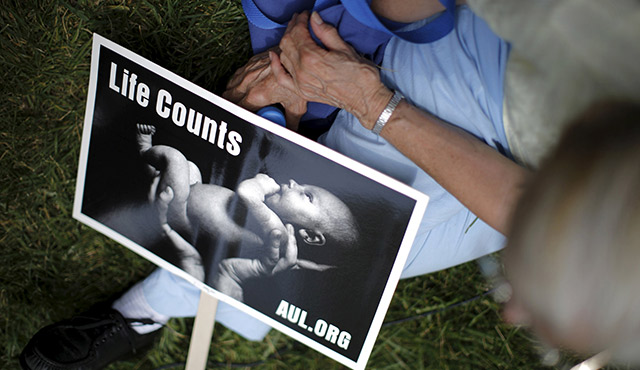In 2011, 1.06 million abortions were performed. From 1973 through 2011, legal abortions took the lives of nearly 53 million human beings. Recently, former Planned Parenthood clinic manager turned pro-life advocate Abby Johnson gave a training for pregnancy help center directors at Christ Cathedral (some 15 centers from all over Southern California were represented). She showed a picture of a large banner on a garage that read, “Good Women Have Abortions.” Is this true, she asked. Of course it’s true. As Frederica Mathewes-Green once put it, “No woman wants an abortion as she wants an ice cream cone or a Porsche. She wants an abortion as an animal caught in a trap wants to gnaw off its own leg.”
On the other hand, Florynce R. Kennedy, an abortion rights activist, is often credited with the statement, “If men could get pregnant, abortion would be a sacrament.” Erika Bachiochi, in her article “I’m a Feminist and I’m Against Abortion,” writes, “Men can have sex and walk away, and with the right Roe gave them, they increasingly do.”
The word “abortion” comes from the Latin aboriri, meaning “miscarry.” In Spanish, there remains one word for both, occasioning the need to identify a miscarriage as a “un aborto espontaneo,” a spontaneous abortion as opposed to a deliberate one. Both kinds of abortion bring unique pastoral challenges around grief and healing (for which the Diocese of Orange has a ministry of Hope and Healing After Abortion).
Yet the word “abortion” itself is maintained and even preferred by Christians, as opposed to euphemisms, such as “termination of pregnancy.” As theologian Stanley Hauerwas points out, “abortion” is a moral description, like “suicide.” Using this language “is one way of training ourselves as Christians to see and to practice its opposite—hospitality, and particularly hospitality to children and the vulnerable.” Abortion names the “mis-carrying” of a life. The failure to carry and to welcome this life constitutes a grave matter, not only for individuals but also for communities of faith. What are we doing to extend radical hospitality to women in crisis pregnancy, to the child in the womb, to men caught up in a culture of failed responsibility, and to teens aching for happiness and fulfillment with the gift of sexuality? It what ways do we as a communities “mis-carry” these lives?
What is our first and best response as Christians? As Pope Francis constantly reminds us: accompaniment (acompañamiento)! We are called to walk alongside women in crisis, offering assistance—material, psychological and spiritual. This work is done beautifully at many parishes throughout the Diocese of Orange and in a special way through our network of pregnancy centers, clinics, and shelters (lifejusticepeace.org/advocacy/pregnancy). We are called to creatively reach those in need, so that truly life-affirming, nonviolent choices are available to those struggling with a difficult situation. Catholics in Orange County collaborate with 40 Days for Life and Sidewalk Advocates to pray for an end to abortion, to advocate for and offer resources to women in crisis, and to offer peaceful witness to a more radical hospitality made possible by the Gospel of Jesus Christ.
This accompaniment witnesses to the society and culture at large that such a radical welcome is not only possible but is in fact taking place. Thy kingdom come, on earth as it is in heaven. Another aspect of our witness is a prophetic voice to what Saint Paul calls the principalities and powers. As a Church, when we advocate for a ban on late-term abortion (the U.S. is one of seven nations that allows elective abortions after 20 weeks), or to defund Planned Parenthood (diverting funds to community health centers), or to provide for childcare, well-woman care, and other means which are, as John XXIII put it, “necessary for the proper development of life, particularly food, clothing, shelter, medical care, rest and, finally, the necessary social services,” we are calling for the nation to live up to its claims and aspirations to be a nation with justice for all. One significant challenge the Church faces to be this witness is the barrage of commercially driven images shaping children, youth and adults to be a people of radical consumption rather than radical hospitality. This challenge of formation for us as a Church includes the challenge to put our partisan politics aside in order to truly work together for the well-being of women, men, children, youth and families.
Caring for women in crisis and expanding life-affirming, nonviolent choices ought to be something that people of both political parties—in fact, all people of faith and of goodwill—can get behind. For this reason, refusing participation in partisan wedging and building collaboration and partnership for the common good should also not only be possible but in fact be a present reality in our parishes and communities. Then, whether by what Saint Therese called “quite hidden little acts of virtue” or by legislative visits or by fundraising campaigns like Pennies from Heaven, we can speak with moral authority to the powers and demonstrate by our actions our commitment to radical hospitality.
October is Respect Life Month in the Diocese of Orange. For more information on how to get involved, go to rcbo.org/resource/respect-life.

